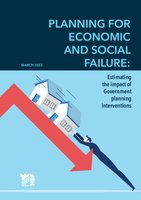A new report, ‘Planning for Economic Failure’ lays bare the implications of the Government’s anti-development approach to house building, warning that supply could halve and fall to the lowest level since World War Two.
The Government’s appeasement of its backbenchers, and the free rein given to quangos will have disastrous impacts on housing supply.
As well as the much publicised reforms of the planning system that will see local authorities no longer required to plan for the housing needs of its communities, the report highlights the growing list of interventions by the quango Natural England that could see supply fall from 233k last year to below 120k homes per annum in the coming years – well under half the Government’s frequently espoused target of 300k.
Such a fall has significant social and economic implications for the country and would deepen the housing crisis and intergenerational inequalities and cost;
- nearly 400k jobs – including 4000 apprentices ;
- Over £20 billion less economic activity being generated
- Over £3 billion less investment in affordable housing
Stewart Baseley, executive chairman of HBF said; “The increasingly anti-development and anti-business policy environment poses a real threat to house building and is inevitably at the forefront of minds when investment decisions are being made.
Baseley added: "The Government’s capitulation to the NIMBY lobby and its mishandling of water and drainage legislation could see fewer homes built than ever before. The social and economic implications are stark and threaten to widen the ever growing intergenerational divide while costing hundreds of thousands of jobs.
Baseley concluded: "As we try to tackle the housing crisis during a recession, with tighter mortgage availability and no government scheme to assist buyers purchase new builds for the first time in decades, short-term political decisions to appease backbenchers seriously threaten confidence.”
Main causes for collapse in supply:
Planning
Research by Lichfields for HBF and the LPDF shows that the changes to planning policy proposed by the Housing Secretary as a result of the revolt by MPs led bv Theresa Villiers could result in a drop of 77,000 homes a year. Although still subject to consultation, local authorities are already adopting the anti-development reforms with 47 so far having paused their local plan-making processes.
Nutrients
120,000 homes are now on hold as a result of Natural England’s moratorium on housebuilding in more than a quarter of local authority areas.
The problem first arose some four years ago, following Natural England’s aggressive interpretation of an EU Court of Justice ruling relating to nitrogen levels in Dutch waterways.
Defra has acknowledged that the vast majority of nitrate and phosphate pollution of waterways is caused by agricultural practices and the long-term failure of water companies to upgrade wastewater treatment facilities. However, Natural England has acted exclusively against home building, arguing that the occupants of new homes, through their use of showers and washing machines will endanger the health of rivers. This is despite the fact that the home building industry has paid an estimated £3bn to water companies in the past 30 years in the form of ‘Infrastructure Charges’.
The report shows that, in addition to the estimated 120,000 homes already blocked a further 41k homes a year will now not come forward is workable solutions are not implemented.
Other
Natural England’s overzealous approach to a range of other Issues has also provided opportunities to block development in other areas around the country.
Water neutrality: Parts of Sussex have become No Development Zones owing to water availability and concerns about the long-term prospects of an aquatic snail.
Recreational Impact Zones: Natural England has intervened to prevent new homes being built within 15km of beauty spots and national parks because of fears that residents of new homes may choose to walk dogs or go jogging in these areas.
Air quality: Natural England is now consulting on plans to impose restrictions on development where new properties may lead to residents driving close to beauty spots and thus generating air pollution. This is despite all new homes built from 2022 having Electric Vehicle charging points as standard
Housing supply
In 2012/13, England saw the lowest peacetime level of housing supply ever recorded. A series of policies introduced by a Coalition Government with a desire to build more homes to address decades of undersupply and boost the economy, led to a rapid increase in output such that by 2019, net supply in England had doubled, surpassing the highs seen during the housing booms of the 1950s and 1960s.
The increases in housing supply can be attributed to a range of factors, including the introduction of the National Planning Policy Framework (NPPF) in 2012, the Help to Buy Equity Loan Scheme, as well as a general positive attitude towards development that positioned the UK as an attractive location for investment in future supply, which allowed homebuilding to flourish.
However, in the recent period, a hostile political attitude towards building has driven a policy agenda that has, on the whole, sought to restrict housing delivery. .
The proposed changes to the planning system, and the free rein afforded to Natural England to impose new requirements on development are risking the progress in tackling the housing crisis made over the past decade. The combination of these factors has the potential to see net housing supply drop as low as 111,000 per year, around 10% lower than the previous the lowest ever annual net supply during peacetime.
- ENDS -
For media enquiries, or to arrange an interview, please contact media@HBF.co.uk
Notes to Editors:
- The Home Builders Federation (HBF) is the principal representative body for private sector home builders and voice of the home building industry in England and Wales. HBF member firms account for some 80% of all new homes built in England and Wales in any one year, and include companies of all sizes, ranging from multi-national, household names through regionally based businesses to small local companies: www.hbf.co.uk
